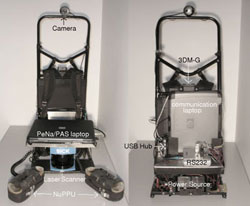Humans and robots collaborate through telematics
The PELOTE project has extensively investigated new methods and technologies for improving cooperation between robots and humans in order to improve the performance of such heterogeneous systems. One of the key project results is the personal navigation (PeNa) system for indoor environments. This offers effective coordination of non-living systems and human actors in a common environment. The main innovative aspect of the PeNa system is that it allows localisation of humans in an indoor environment. It constitutes a stand-alone system that doesn't rely on any infrastructure for localisation. Localisation is achieved through adoption of a dead reckoning approach. This allows estimation of one's position on the basis of a previously determined situation along with a map-based localisation method. The hardware comprises batteries, power conversions, Stride Length Measurement Unit (SiLMU), a fiber optic gyro, a compass, a SICK laser scanner and a laptop. With all hardware being mounted in a backpack, the laptop that is installed in the front also serves as a display for user interface. The developed prototype offers localisation of humans in an indoor environment with bounded error. The PeNa may be employed to include humans into a telematic system of hybrid entities. The operator is therefore allowed to control humans as if they were teleoperated robots. This system has major potential applications particularly in rescue situations where efficient coordination of heterogeneous teams leads to successful operations. Apart from location-based services, another important area of application is the ever-growing intelligent systems in living environments. The basic design concept of PeNa offers a virtual description of the real environment with a large amount of objects. Such an environment may act as an interface to control any device with an unlimited variety of applications (service robots, home automation systems, control of surveillance equipment). For more information click at: http://labe.felk.cvut.cz/~pelote/(opens in new window)







